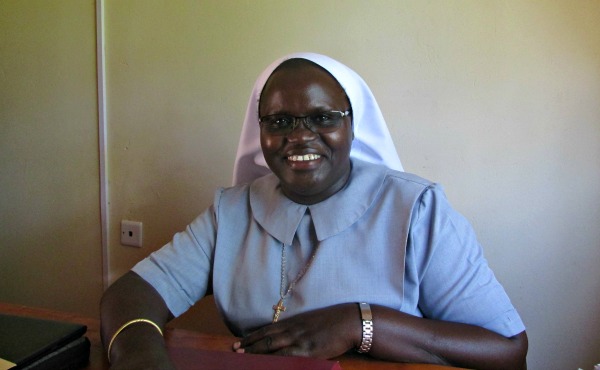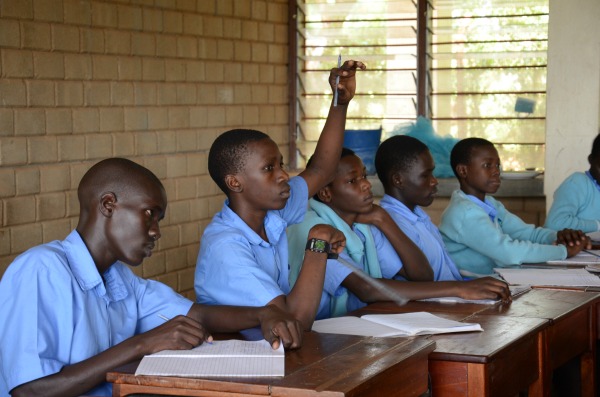
Sr. Dr. Alice Jurugo Drajea
Currently I serve the Catholic Diocese of Arua. It is in the West Nile Region in North Western Uganda as Deputy Education Secretary. My specific area is to supervise and coordinate preprimary and primary schools under the Catholic Foundation to ensure quality education. My senior, Fr. Andrew Inyaga the Education Secretary, takes care of the secondary schools and at the same time teaches in the diocesan minor seminary while being a chaplain at the urban Mvara secondary school.
Some of these schools are government aided while others are private. There are over 200 primary schools and 35 secondary schools under the Catholic Church foundation and several Early Childhood Development Centres spread in the six districts in Arua Diocese—Arua, Adjumani, Moyo, Koboko, Maracha and Yumbe. To date, the scope of operation has greatly expanded due to the influx of South Sudanese refugees following the political unrest since December 2013. For example, in Adjumani refugee settlements are estimated to have 200,000 people while over 150,000 refugees reside in Bidibidi Settlements in Yumbe districts, both of which are in Arua diocese. The majority of this population are children and women.
The opportunity for work is great and the schools are full of children. Parents are keen to see their children get quality education but the broader systems’ challenges—political, economic and social—present significant obstacles. The diocese itself has structures for development including the education sector. But being an African local diocese, its financial strength is limited to achieving its intended development goals for the people of God, and indeed for the country.This is mainly because the greater number of the population are poor with far less economic and financial strength.

Ocer Campion Jesuit College, Gulu, Uganda
Achievements
So far, we have run workshops for head teachers and their deputies in partnership with Justice and Peace Group based in Kampala. We have attended national meetings organized by the Ministry of Education and Sports (MOES) on issues related to teacher transfers. We have also met with head teachers of primary schools in four districts of Arua Diocese and now we are left with two districts to cover before the academic year comes to a close in December. Our discussions focus on the strengths (opportunities) in their schools, challenges (weaknesses) and what can be done in order to forge ways forward for best performance in their schools. There is good collaboration with government and church for development. The head teachers appreciate these visits as they hardly get any from the local education offices.
Main challenges
Transport: Two of us nuns work at the diocesan offices: Sr. Juliet Awachango and myself. Both of us have no means of transport to our places of work. We use hired motorcycles (locally known as bodaboda) which is very risky and prone to accidents. It is worrying, especially when you sling your laptop on your shoulder. For my part and my colleague, Fr. Andrew, we are not able to make visits to schools as we would like to. The schools are many and we have to request the main diocesan administration to slot our visits to schools in their programme, which makes it slow and uncertain.
No fixed office/equipment: The diocese is currently undertaking major structural adjustment with departmental offices. We have been moved from our office to another and where we are is temporary so we cannot invest in the office in terms of electrical installation, internet, computer, printing etc. We have to use our own cell phones for contacting schools and the MOES including other organisations with an interest in education. You call at your own expense, there is no landline in the office, no phone allowance or transport allowance given for day-to-day official operations. In addition, there is a lack of digitalized data: almost all the school data are still in print, therefore work becomes tedious.
Low allowance: I work eight hours a day and five days a week, and my salary is less than €150 per month. This causes financial insecurity when I have to contribute to my community for our sustenance. Our community is in town which means we are subject to water and electricity bills, paying of a cook and a watchman, not to mention our daily food, medical, personal needs and garden work to supplement our little pay. The other two sisters get much less and so as a community we cannot have money to spend daily on both food and transport to the workplace. As a result Sr Julie, who works in the project office doesn’t have lunch. It is expensive to prepare snacks as what we have is for our main meal. There are no sandwiches here.
Our hope is that with time, some of the working conditions will improve especially when the office renovations are completed. But the problem of means of transport is huge and worrying, and that of motivation through insufficient salaries remains uncertain.
Sr. Dr. Alice Jurugo Drajea is a PhD holder in education from Trinity College Dublin in Ireland with an MA in Educational Leadership and Management, and a BA in Educational Theory and Practice. Her background is in secondary school teaching. Sr. Alice served her congregation in a leadership role in Uganda Province overseeing 24 communities.
Author: Sr. Dr. Alice Jurugo Drajea, 14th November 2016

